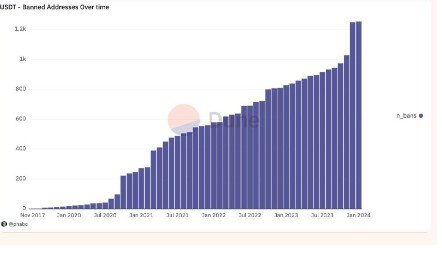More than Numbers: Decentralized Stablecoins Amid Blockchains and Ethereum Network Risks
~878 million USDT stored on 1,254 addresses on the Ethereum network have been blacklisted (frozen) thanks to a feature in the USDT smart contract that provides the ability to add to the blacklist via addBlackList (0x0ecb93c0). Detailed statistics can be found on the dashboard on Dune.
Interestingly, in the blacklist function, the parameter for the address is called _evilUser. The smartcontract owner can perform a "cleanup" of the blacklist via removeBlackList (0xe4997dc5) or completely destroy "malicious" funds via destroyBlackFunds (0xf3bdc228).
This demonstrates the principle of decentralization and non-custodiality. There is no blacklist function in the DAI contract and the contract itself is immutable. This information can be confirmed on Dune.
However, it is worth considering that noble bankers can attack the DAI and decouple it from the dollar, as happened in March 2023 when the DAI fell to $0.88. More than half of the DAI's reserves are backed by the other USDC stablecoin, which also lost its peg to the dollar in March and fell to $0.8713 due to the bankruptcy of Silicon Valley Bank, which held $3.3 billion of the USDC's reserves.
Stablecoins are designed for trading or quick transfers of small amounts, but it is not recommended to store large funds in these dollar counterparts, as your wallet can be locked when using USDT or USDC, and your assets can lose value in the case of DAI, although you will still have them.
